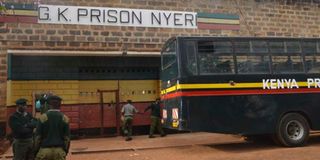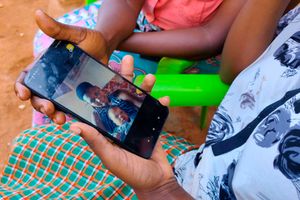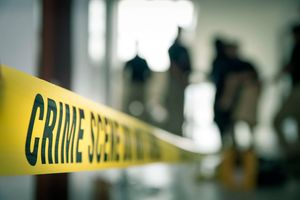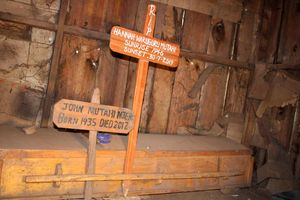
King’ong’o GK Prison in Nyeri where Mr John Ritho Kiboi and his sons will be serve time after being convicted for assault.
A 61 year-old man, his three sons and son-in-law have lost a bid to overturn an 100-year collective jail term for assaulting their neighbour following a bar brawl.
And true to the scriptures (Matthew 5:25) "Come to terms quickly with your accuser while you are going with him to court, lest your accuser will hand you over to the judge, and the judge to the guard, and you will be put in prison", the imprisonment of the five family members in April 2024 resulted from failed reconciliation efforts by their village chief.
Mr John Ritho Kiboi and his sons were convicted for attacking Mr John Gichuki.
During the mediation it had been agreed that the family would compensate Mr Gichuki by settling his medical bill amounting to Sh800,000 but they rejected the offer and opted for the court process.
The feud started with an altercation between Mr Kiboi and Mr Gichuki in a pub at Ganyuthe trading centre in Kieni West sub-county, Nyeri, where they were enjoying alcohol on the evening of November 17, 2019.
They occupied different tables at the entertainment joint catching up on the day's happenings. Mr Gichuki was with his wife while Mr Kiboi was with other revellers including his son-in-law Evans Waititu.
The source of the altercation was partly because of a bar talk disagreement. Mr Gichuki allegedly overheard the revellers discussing him and describing his family as proud. Mr Gichuki's wife later left the pub.
Few hours later, Mr Gichuki was waylaid on his way home by five people believed to be Mr Kiboi, his three sons -John Ritho, Paul Kiboi and Kenneth Wachira and the son-in-law Waititu. They inflicted on him life threatening injuries.
Alhough the assault happened in the cover of darkness and there was no eye witness, the victim said he was able to identify the attackers and his account of the incident was believed by both the police and the court.
The issue of identification was one of the most contested facts during the court trial of Mr Kiboi and his sons since it was stated that there was no light at the scene of crime.
Their lawyer Dr Adrian Kamotho submitted that the critical elements of the offence were not proven beyond a reasonable doubt, particularly due to lack of proper identification of suspects from the mob that allegedly attacked the complainant.
"The court erred by relying on evidence of identification, without observing that the lighting conditions prevailing at the scene as well as the time of the offence is alleged to have taken place were absolutely difficult for a witness to make any significant identification. Thus, an injustice was occasioned on the accused by convicting and sentencing them for the offence," said Dr Kamotho.
Because of the existing bad blood between Mr Gichuki and Mr Kimani, the defence argued that the prosecution evidence was not credible to secure a conviction.
They were charged with grievous harm, which they vehemently denied but trial magistrate Mercyline Lubia ruled that they were positively identified by the victim and slapped each of them with a 20-year jail term. The trial court acknowledged that the lengthy incarceration would badly hit the five individual families.
"I empathize with the families of the five accused persons. They indeed stand to suffer as a result of the heinous crime meted on the complainant and the serious injuries suffered," said the magistrate.
Mr Gichuki testified that it was around 9.00pm when he met the five accused persons while armed, and they started attacking him. He called out all the accused by name.
He was hit with a metal rod, fracturing his right hand and that the main defendant, Mr Kiboi, was armed with a mason’s hammer, which he used to hit the victim on the head.
They left and the victim, however, made his way home bleeding. He testified that he lost consciousness and was taken to Mathari Mission Hospital Nyeri by his family and regained consciousness at Outspan Hospital while undergoing treatment.
The incident was reported by his sister to the Kiawara police station after two days. As investigations commenced, Mr Kiboi and his four sons went into hiding, a move that court said pointed to their guilt. They resurfaced one year later in December 2020 and were arrested.
"Notably, the issue of the appellants going into hiding was elicited during cross-examination of the witness and was not contradicted by any of them. The court finds this conduct consistent guilt. For circumstantial evidence to work, it must be inconsistent with the accused’s innocence," said High Court judge Kizito Magare last week while upholding the conviction and sentence.
The judge dismissed their petition of appeal upon finding that the assailants were properly identified by the complainant and that the injuries suffered were not from a sporting event.
"Mr Gichuki was able to positively identify all the appellants by way of recognition. In regard to Mr Kiboi, evidence had established that he had an earlier altercation with Mr Gichuki, which culminated in the complainant being waylaid on his way home," said Justice Magare.
"The investigating officer testified that the appellants disappeared from their usual place of residence for over one year and were only arrested thereafter. This testimony was neither challenged in cross-examination nor rebutted in any other way," he added.
The victim had testified that though he could not describe the clothes each of the suspects was wearing, he recalled that Mr Kiboi held a mason hammer in his right hand and was wearing an orange pair of jeans trouser and safari boots.
The case investigator, police corporal James Njoka, said that the victim suffered hand and head injuries in an attempt to shield himself, and that he fell after which the assailants began pelting him with stones. He told court that the degree of injury was assessed as grievous harm.
Dr William Muriuki testified that upon medical examination, the victim was found to have sustained a severe head injury, including a depressed scalp fracture and a laceration on the head.
The patient underwent surgery as a result of these injuries, he testified. The injuries were consistent with trauma inflicted by force using a blunt object. He produced the duly completed P3 form in evidence.
At the stage of hearing the defence side of the story, Mr Kiboi opted to remain silent "thereby exercising his constitutional right against self-incrimination" while the rest chose to give evidence denying their involvement or presence at the scene of crime.
They stated that the incident was a hearsay to them. Their explanations failed to cast doubt on the Prosecution's evidence and was hence rejected by the court.
Justice Magare held that the injuries suffered by the victim were unlawfully caused and parties agreed that there was a fight or attack of some kind or another.
"The injuries were not from a sporting event. None of the parties stated that he suffered injuries while playing. It was common ground that Mr Gichuki was attacked. The only dispute was whether the appellants caused this or not. The harm must not be caused by play or activity that the parties agreed to. For example, if a person attends a bull fight and is gored, he cannot be said to be unlawfully harmed," said Justice Magare.
Dismissing the appeal, the High Court observed that Mr Kiboi and his sons should consider themselves lucky as they serve time in jail.
This is because the prescribed punishment for grievous harm in Section 231 of the penal code is imprisonment for life. The judge said the jail term handed by the trial court on the five family members was a slap on the wrist.
"The court considered mitigating circumstances in determining the appropriate sentence. Apart from the fact that the appellants were first offenders, no substantial mitigating factors were presented. Despite this, the court imposed a sentence of 20 years’ imprisonment, which was significantly lenient given the severity of the offence and the availability of a life sentence," he stated.
The judge said that by all standards, the sentence did not reflect the gravity of the crime and as such it amounted to a mere
slap on the wrist.
"The appellants displayed no remorse and rejected the olive branch extended by the near-death complainant. The injuries inflicted, particularly to the head, were life-threatening. In the circumstances, the sentences imposed were appropriate. There are no materials that the court ignored in giving the sentence. The appeal on sentences is thus untenable," said Justice Magare.
He explained that grievous harm is the most serious injury outside murder and allied offences.
"The P3 and the evidence of all the prosecution witnesses was succinct that the injuries suffered were life threatening. I am satisfied, beyond any reasonable doubt, that the element of grievous harm was proven," he said.
In their appeal, the accused had faulted the trial court on various grounds including a claim that sentences imposed were harsh since they were first time offenders and were qualified for a light punishment.
They added that the trial court erred by convicting them without considering that the prosecution evidence was full of contradictions and was not corroborated which was inconsistent with the provisions of the Evidence Act.
However, the judge stated that all factors considered, there were no exculpatory evidence inconsistent with the innocence of the appellants and ruled that they were properly convicted in accordance with the law.
He declined the defence argument that totality of the evidence presented by the prosecution witnesses was not one that could sustain a conviction.







